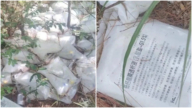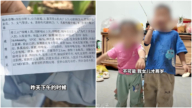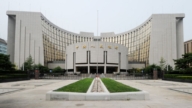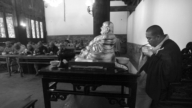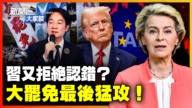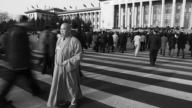【新唐人2011年12月2日讯】中国11月份制造业出现萎缩,创下2009年初全球金融危机以来的最低水平。11月30号,大陆央行近3年来首次下调存款准备金率。一些媒体和经济学家认为,中国政策重心已从抑制通货膨胀转向促进经济增长和创造就业;而北京官方学者并不认为中国货币政策的基调发生了改变。
中国11月份制造业采购经理指数(PMI)从10月份的50.4降到49,这是自2009年2月以来首次跌破50这一临界点。PMI数值高于50表明制造业活动扩张,低于50则表明收缩。
“中国物流与采购联合会”发布的官方PMI指数,表明通货膨胀压力继续减退。11月份新出口订单指数从10月份的48.6大幅降到45.6,《华尔街日报》指出,这表明欧美经济衰退正对全球的中国商品需求构成影响。
通过下调存款准备金率0.5个百分点,央行实际上向银行业体系注入了约4000亿元人民币,从而使得银行可以向日益减速的经济投放更多贷款。
英国《金融时报》说,这是对连续两年货币政策逐步收紧的一个逆转。两年来北京当局一直试图为经济增长降温,同时抑制物价的持续上涨。
另一方面,11月份全国100个城市的房价,连续第三个月环比下降,并创出今年以来最大环比降幅。全国楼市销售量都出现大幅下滑。
“纽约城市大学”经济学教授陈志飞认为,比较“通货膨胀”和“硬着陆”,中共政府还是选择先解决“硬着陆”问题。
陈志飞:“由于中国政府没有采用国际惯例,利用储蓄率、银行贷款利率来调整流通,而是采用了银行准备金的这种方式,将会使这些现金,很大程度上流入国营企业或者是房地产信贷产业,这样可能会造成房市的卷土重来。”
中共副总理李克强日前表示,明年将坚持实施房地产调控措施。《华尔街日报》说,随着流动性的放松,这项工作的难度将增大。政府面临的挑战将是引导额外的贷款流入中小企业,而不是豪华住宅楼开发商之手。
《人民日报》说,中国这次下调存准率并不是针对房地产行业,更不意味着房地产宏观调控政策的放松,也难以改变房价下降的趋势。
《华尔街日报》则表示,中国放松货币政策的行动时间早于多数经济学家的预期,经济学家们预计中国未来数月将进一步放松信贷。
国务院发展研究中心金融研究所副所长巴曙松认为,这次下调存准率,是为了缓解银行体系流动性偏紧的局面,稳定增长将被摆在更重要的位置,但并不意味着稳健的货币政策的基调发生改变,未来物价走势仍有不确定性。
陈志飞:“中国政府陷入一个进退两难的境地。如果采取宽松政策,会导致通货膨胀的上升。如果不这样做,中国经济就会硬着陆。”
中国大陆的央行下调存准率出台几小时后,美联储、欧洲央行、日本央行等发达国家六大央行宣布,向有需要的任何银行提供更低息的美元贷款。
知名财经评论家叶檀表示,全球主要央行的联合救市行为,意味着以货币紧缩为代表的市场正常化努力,在债务危机的倒逼下宣告失败。央行的宽松行为,说明以往的货币泡沫所酿造的货币危机已到不可收拾的地步。
叶檀指出,放松货币政策只能短期镇痛,救不了实体经济。全球实体经济缺的不是资金,而是新的经济增长点、新的盈利模式,以及对于此前的高福利政策的反思。此时逼迫银行贷款、企业投资,只能恶化未来的资金配置,导致进一步的产能过剩。
新唐人记者李元翰萧宇报导。
Beijing Cuts Reserve Ratios
China’s manufacturing sector started to shrink in November,
falling to its lowest level since the global financial crisis.
On November 30, China’s central bank cut
its bank reserve ratios for the first time since 2009.
Media professionals and economists comment,
that China’s monetary policy prioritization has shifted.
It moved from curbing inflation
to promoting economic growth and creating jobs.
However, Beijing regime’s official scholar
does not admit this shift.
China’s official Purchasing Managers Index (PMI) fell to 49
from 50.4 in October,
the first time below the tipping point since February 2009.
A reading above 50 indicates manufacturing’s expansion,
while a value below 50 indicates contraction.
Released by China Federation of Logistics & Purchasing,
official PMI showed inflationary pressure continued to decline.
The new export orders index in November plunged to 45.6
from 48.6 in October.
Wall Street Journal reports say this indicates that economic
recession in Europe and the US affected the global demand for China’s commodities.
China’s central bank cut reserve ratios by 50 basis points,
equating to injecting cash RMB 400 billion into the banking system.
The action enables the banks to offer more loans
to the increasingly slowing economy.
UK’s Financial Times said that this is a reversal
of its monetary policy after more than two years of tightening.
The Chinese Communist Party (CCP) regime has been trying
to cool economic growth while suppressing price rising.
Additionally, the housing prices in 100 cities in China dropped
for a third consecutive month, the highest decrease in 2011.
Nationwide property sales have dropped sharply too.
Economics professor at the City University of New York,
Chen Zhifei said, out of the inflation and hard landing issues, CCP’s authorities have chosen to solve the hard landing.
Chen Zhifei: “This is because China’s authorities didn’t adopt
the international practice of using savings’ interest rate and bank loan interest rates to adjust the cash flow.
Rather, it adjusted the bank reserves.
This will enable the cash to largely flow into the state-owned
enterprises or the real estate credit market, which might result in a comeback of housing market bubbles.”
CCP’s Vice Premier, Li Keqiang, said recently that in 2012,
real estate control measures shall be firmly implemented.
Wall Street Journal commented that the relaxation of cash
liquidity will increase the task’s difficulty.
The CCP authorities’ challenge is to lead the extra loans
into the small and medium enterprises, instead to the hands of real estate developers.
According to CCP’s mouthpiece People’s Daily,
the reserve ratios cuts do not aim at the real estate sector,
nor do they signal for easing up the real estate market control,
neither help changing the downward trend of housing prices.
Wall Street Journal said that China released easing
of monetary policy earlier than most economists expected.
The economists estimate further easing of credit terms
in the next few months.
The Deputy director of Institute of Finance at State Council
Development Research Center, Ba Shusong, explained why.
Ba said, the official reserve ratios cuts were to ease
the banks’ tight liquidity situation.
The steady growth would be prioritized, but this
does not mean to change the prudent monetary policy.
Ba believes the future price trend still remains uncertain.
Chen Zhifei:“China’s regime faces a dilemma.
If it adopts a liberal policy, this will lead to a higher inflation.
If it fails to do that however,
China’s economy will have a hard landing.”
A few hours after the China’s bank reserve ratios cuts,
six central banks in developed countries made an offer.
US Federal Reserve, European Central Bank and Bank
of Japan amongst others, offered loans in US dollars at a lower interest rate to any bank in demand.
Renowned financial commentator Ye Tan said,
the global major central banks’ joint bailout is indicative.
It means, market normalization efforts of monetary tightening
had collapsed under the pressure of debt crisis.
China’s central bank easing policy shows the monetary crisis,
caused by the past monetary bubble, is out of hand.
Ye Tan points out that the easy monetary policy can only be
a short term painkiller, but it can’t be helpful to the economy.
The global economy does not lack funds, but new economic
growth points, new profit models, and a reflection of the high welfare policies of the past.
Forcing now banks to give loans and businesses to invest,
can only worsen the fund allocation misbalance and the overall situation..
NTD reporters Li Yuanhan and Xiao Yu



